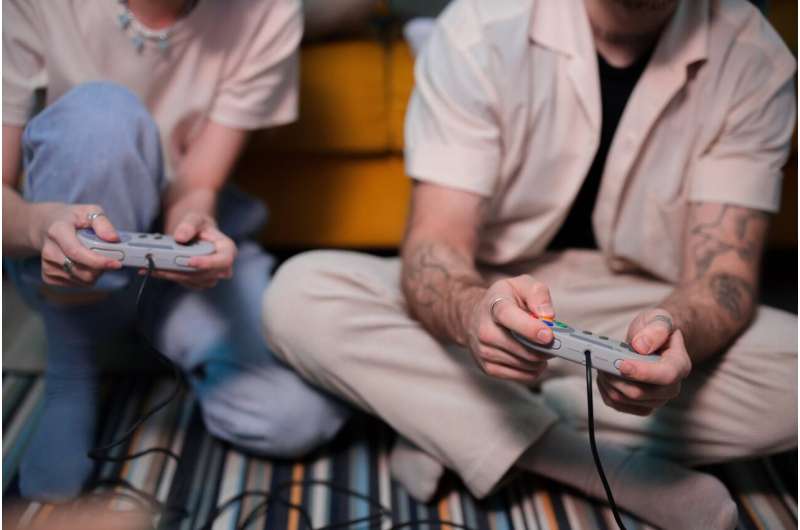This article has been reviewed according to Science X's editorial process and policies. Editors have highlighted the following attributes while ensuring the content's credibility:
fact-checked
peer-reviewed publication
trusted source
proofread
Neuroscientific study suggests violence in video games does not negatively impact adults' empathy

Neuroscientists from the University of Vienna and the Karolinska Institute in Stockholm have investigated whether playing violent video games leads to a reduction in human empathy. To do this, they had adult test subjects repeatedly play a violent video game over the course of an experiment lasting several weeks. Before and after, their empathic reactions to another person's pain were measured.
It turned out that the violent video game had no noticeable influence on the ability to empathize or the brain activity that underlies it. These results have now been published in the journal eLife.
Nowadays it is impossible to imagine living rooms and children's rooms without video games. Many of the most popular video games contain explicit depictions of extreme violence. Concerns are therefore repeatedly raised in public discourse that these games dull the compassion of their players and thus lower the inhibition threshold for real violence.
An international research team led by the Viennese neuroscientists Claus Lamm and Lukas Lengersdorff has now investigated whether this is actually the case.
The Austrian and Swedish scientists invited a total of 89 adult male test subjects to the study. A central selection criterion was that the people had had little or no previous contact with violent video games. This ensured that the results were not influenced by different experiences with video game violence.
In a first experimental study, the test subjects' basic level of empathy was measured. Brain scans were used to record how the test subjects react when painful electric shocks are administered to a second person. The video game phase of the experiment then began, during which the test subjects came to the research laboratory seven times to play a video game for one hour each.
The participants in the experimental group played a highly violent version of the game Grand Theft Auto V and were given the task of killing as many other game characters as possible. In the control group, all violence was removed from the game and the participants were tasked with taking photos of other game characters. After the video game phase, the test subjects were examined a second time to determine whether their empathic reactions had changed.
Analysis of the data showed that video game violence had no discernible effect on the subjects' empathic abilities. The reactions of the participants in the experimental group who were confronted with extreme depictions of violence did not differ statistically from those of the participants who only had to take photos. Additionally, there were no significant differences in the activity of brain regions identified in other studies as being related to empathy—such as the anterior insular and anterior midcingulate cortex.
So were the scientists able to show that concerns about violence in video games are unfounded? The authors advise against jumping to conclusions. "Especially because this is such a sensitive topic, we have to be very careful when interpreting these results," explains lead author Lengersdorff, who carried out the study as part of his doctoral studies.
"The conclusion cannot under any circumstances be that violent video games have now been definitively proven to be harmless. Our study lacks the data to support such statements." According to the neuroscientist and statistician, the value of the study lies in the fact that it allows a sober look at previous results.
"A few hours of video game violence have no significant influence on the empathy of mentally healthy adult test subjects. We can clearly draw this conclusion. Our results therefore contradict those of previous studies in which negative effects were reported after just a few minutes of play."
This difference is most likely due to the fact that in most previous studies, playing the violent video game occurred immediately before data collection. "With such experimental arrangements, however, the short-term effects of video games cannot be distinguished from the long-term ones," explains Lengersdorff.
According to research group leader and co-author Lamm, the study also sets a new standard for future research in this area. "For clear statements about the effects of violent video games, strong experimental control and longitudinal research designs are needed that allow causal conclusions to be drawn. With With our study we wanted to take a step in this direction."
It is now the task of further research to check whether no negative consequences occur even after significantly longer contact with video game violence—and whether this is also the case in vulnerable population groups.
"The most important question is of course: are children and young people also immune to violence in video games? The young brain is highly plastic, so repeated exposure to violent depictions could have a much greater effect. But of course these questions are difficult to investigate experimentally without to push the boundaries of scientific ethics," said Lamm.
More information: Lukas Leopold Lengersdorff et al, Neuroimaging and behavioral evidence that violent video games exert no negative effect on human empathy for pain and emotional reactivity to violence, eLife (2023). DOI: 10.7554/eLife.84951


















